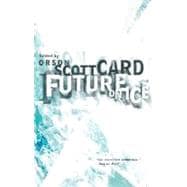
Note: Supplemental materials are not guaranteed with Rental or Used book purchases.
Purchase Benefits
What is included with this book?
| Preface | p. 9 |
| Introduction: Science Fiction and "the Force" | p. 11 |
| Robot Dreams | p. 27 |
| Portraits of His Children | p. 35 |
| Tourists | p. 73 |
| Blood Music | p. 87 |
| Time's Rub | p. 113 |
| Shanidar | p. 129 |
| Speech Sounds | p. 151 |
| Snow | p. 167 |
| Klein's Machine | p. 183 |
| Pots | p. 199 |
| Press Enter | p. 229 |
| Dinosaurs | p. 289 |
| Face Value | p. 315 |
| Cabracan | p. 329 |
| Rockabye Baby | p. 347 |
| The Pure Product | p. 375 |
| Out of All Them Bright Stars | p. 397 |
| The Fringe | p. 409 |
| Table of Contents provided by Blackwell. All Rights Reserved. |
The New copy of this book will include any supplemental materials advertised. Please check the title of the book to determine if it should include any access cards, study guides, lab manuals, CDs, etc.
The Used, Rental and eBook copies of this book are not guaranteed to include any supplemental materials. Typically, only the book itself is included. This is true even if the title states it includes any access cards, study guides, lab manuals, CDs, etc.
by Isaac Asimov
I've already written a lot about Isaac Asimov: how I think him the supreme practitioner of the American tradition of plain style. How I find his work, though he was an avowed atheist, some of the most deeply religious writing I've read. How, unlike many other writers, he seemed only to get better (and wiser) as he got older. Those essays were printed elsewhere; they're still true, in my opinion.
Asimov is dead now; his string of great science fiction writing has ended. A few books are being written in his name, continuing some of his stories, but those aren't Asimov novels anymore. None of us can match the brilliant clarity of his writing, and none of us will ever be able to approach issues and stories from his viewpoint, with his insights and wisdom.
Nowhere is Asimov more clearly revealed than in the story you're about to read. "Robot Dreams" is a morally recursive dilemma, forcing us to face the limits of tolerance and liberality even as we yearn to erase those limits. Asimov was often accused of not creating characters (a charge he tacitly accepted in an essay he wrote called "The Little Tin God of Characterization") but the charge was never true. There are characters here, powerful ones; great heroes, in fact, carrying the futures of species within them in their majesty. It's just that, like his style, Asimov's characterizations are so subtle that you aren't aware of them. He slips them into our memories unnoticed. But that's when they have the power to change us.
I met Asimov only twice, once merely to shake hands and say hi, the second time for a little longer. It was the Nebula banquet where he was given his Grandmaster Award and I received something or other--and I honestly don't remember what--but we stood side by side as they snapped pictures of us. With his typical modesty (the boasting was a public persona) he pointed to my Nebula and said, "That's the real award. This one"--his Grandmaster Award--"they gave me for not being dead yet."
I couldn't let that statement go unchallenged. I tried to tell him how wrong he was, what a giant he was, how we all learned from him, how--but he didn't want to hear it. I was embarrassing him. I stopped talking. It didn't matter: He either knew what he had accomplished, or he never would, certainly not from my babbling.
And later, I was invited to contribute a story to a Festschrift anthology in Asimov's honor. He had opened his fictional worlds to us. I was able to write a Foundation story. So I wrote about a brilliant old man who doubted the worth of his contribution to humanity, and received valediction when he least expected it. I wrote my judgment of Asimov, and my feelings about him, and set the story within his Foundation universe, at the very center, in the library on Trantor. I took one of Asimov's favorite themes, the need for scientists and scholars to break down boundaries between disciplines, and made it the heart of how the library worked. Every word was written to him.
And he never read it. I should have known. Word came back to me that Asimov simply wasn't reading any of the stories. Why? Because, with typical modesty, he was sure that we would have written Foundation and Robot stories that were better than his, and having read our work, he wouldn't be able to find the heart to continue with his own.
So...he never got my letter.
I can only hope he's not too stubborn to read it now.
FUTURE ON ICECopyright 1998 by Orson Scott Card